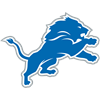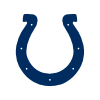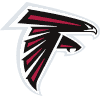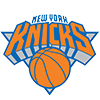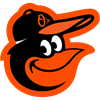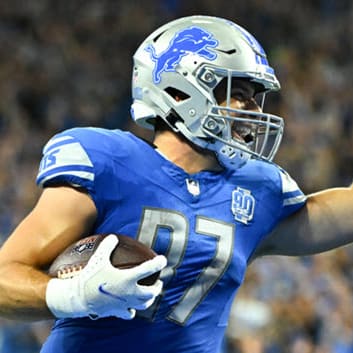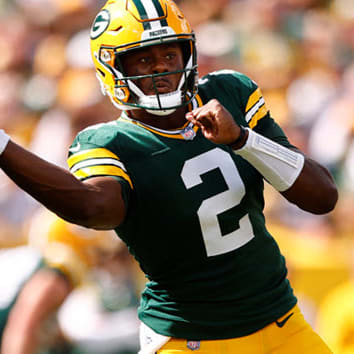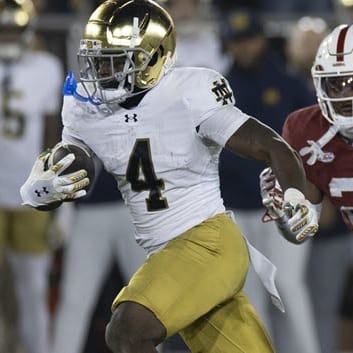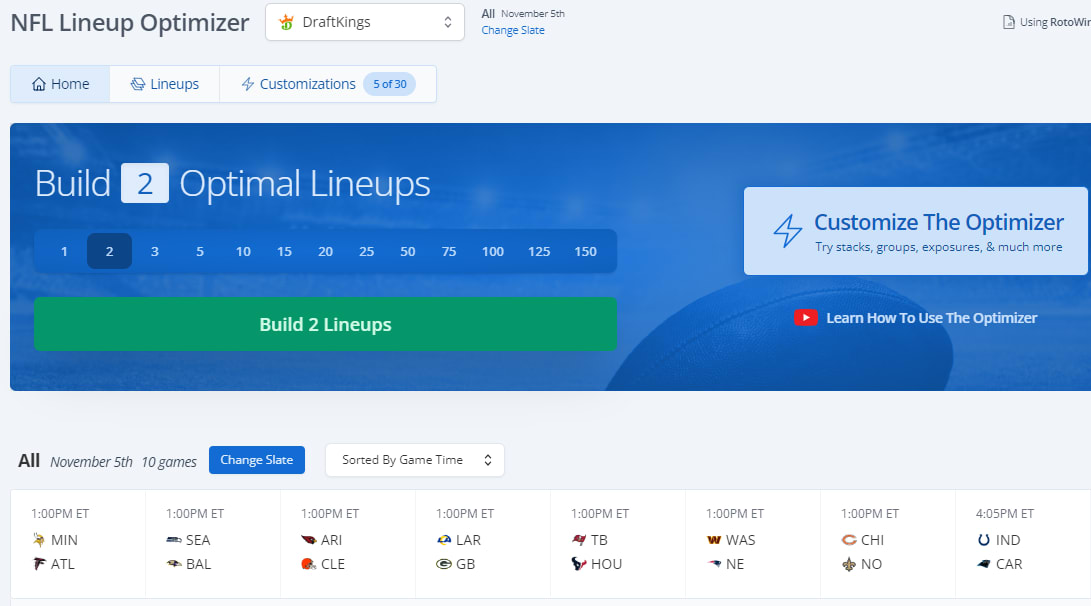Our first two installments of Breakout Watch remained true to the name, focusing on players with favorable odds to achieve fantasy stardom for the first time. Highlights from the initial breakout column included Marquise Brown and Deebo Samuel, while the second edition added a bunch of tight ends, namely T.J. Hockenson and Hayden Hurst.
Now, we'll look in a slightly different direction, identifying some of 2019's disappointments who have underlying numbers hinting at potential for 2020 rebounds — a.k.a. our bounce-back candidates. Specifically, we'll focus on players that missed time due to injuries, hoping solid per-game or per-snap production from last season can be translated to a larger sample during the upcoming campaign.
Part of the logic is that fantasy managers tend to overestimate the predictive value of past injuries, often assuming that players who have missed time will continue to miss a lot of games, while those that have mostly stayed healthy will continue to do so. A wise man named Jason Thornbury once told it to me best: "Players are injury-prone... until they're not. Players are durable... until they're not."
That's not to say medical records should totally be ignored, but it is best to treat these things on a case-to-case basis, rather than simply avoiding any players that lost significant time to injury during the previous season. After all, it wasn't so long ago that A.J. Green and T.Y. Hilton were considered durable, while Julio Jones and Keenan Allen were known as injury-prone. A mere willingness to question these common labels can lead us to a lot of value in fantasy drafts.
And even when we do harbor legitimate concern for future injury risk, this doesn't necessarily make a player untouchable. Draft software tends to show cumulative production rather than per-game averages, perhaps influencing opponents to focus on the former more so than the latter. In other words, the injury risk tends to be baked into the draft/auction price already.
Last but not not least, we need to remember that 180 fantasy points scored across 10 games is more valuable than 200 points across 16 games. David Johnson in Week 7 last season was a memorable exception, but we'll usually have enough warning to put someone else in the lineup when our usual starter is unable to contribute. A missed game from a starter shouldn't equate to taking a zero in his lineup spot.
Keeping all this in mind, let's take a look at some of the top bounce-back candidates for 2020, along with a few personal favorites — looking at you Mr. Minshew and Mr. Koo — whose per-game production last season was better than most fantasy managers realize.
Quarterbacks
2019 stats prorated to 16 games: 4,998 passing yards, 132 rushing yards, 38 passing TDs, 10 INTs
Stafford was on track for one of the two best seasons of his career in 2019 before a back fracture cost him the final eight games. He finished as QB4 in terms of points per game (20.8), outscoring all besides Lamar Jackson (27.7), Deshaun Watson (21.4) and Dak Prescott (21.1). Not that I expect Stafford to match his 4,998-yard, 38-TD pace from last season, but an 11th-round ADP as a mid-range QB2 seems a bit harsh.
I put Stafford at No. 13 in my recent fantasy QB rankings, encouraged by his streak of 136 consecutive starts prior to last season's injury. Lions GM Bob Quinn said the 32-year-old QB was healthy enough to practice months ago, and the team has promising talent at every skill position on offense.
2019 stats prorated to 16 games: 4,333 passing yards, 39 passing TDs, 6 INTs
Brees is one of those guys who is probably overvalued if you're playing with novices but undervalued if you're drafting/auctioning against experts. The first group tends to favor name-brand commodities, while the second group usually favors young quarterbacks that supplement passing production with rushing stats.
Brees continues to get it done with his arm alone, finishing as QB7 in per-game scoring both of the past two seasons, despite barely playing in one of his 2019 appearances. If we remove the Week 2 contest in which he threw five passes before exiting early due to a thumb injury, Brees moves all the way up to QB2 in per-game fantasy scoring (22.5), with volume (37.3 pass attempts) that lands somewhere between his pre-2017 norm and his reduced 2017-18 workloads. Age-related decline is a perfectly legitimate concern, but another season of the 2019-quality Brees would be far more valuable than his 10th-round ADP suggests.
2019 stats prorated to 16 games: 3,738 passing yards, 393 rushing yards, 24 passing TDs, 7 INTs
Minshew finished his debut campaign as QB17 in per-game scoring (16.4), ahead of Kirk Cousins, Jared Goff and Jimmy Garoppolo, among others. Those numbers include two partial games in which the rookie replaced an injured or ineffective Nick Foles, thus missing out on eight drives. Even if he's never better than average as a passer, Minshew's love of scrambling bodes well for his chances to become a solid QB2 for fantasy teams. His 50 scrambles on dropbacks were a league-high last year, and his 350 rushing yards from those plays ranked second to only Lamar Jackson's 430, per PFF.
Running Backs
2019 stats prorated to 16 games: 186-742-6 rushing — 54-402-5 on 61 targets
Conner's 2019 average of 14.6 PPR points placed 17th among running backs, representing a huge decline from 2018 (21.5 ppg, 7th) but still leaving him with some fantasy value as a mid-range RB2. There were also two games where injuries forced him to leave before he reached 15 snaps, and if we remove those contests from the equation, his average bumps to 17.5 ppg (RB9). This is all reflected in an impressive mark of 0.45 PPR points per snap (per PFF), which tied Christian McCaffrey and DeAndre Washington for seventh best among RBs.
There's no doubt Conner was a huge disappointment as a first/second-round fantasy pick last season, but that doesn't make him a bad selection in Round 4/5 this year. Just don't expect a repeat of the 2018 breakout stats, which largely occurred in a one-man backfield. While he still projects as the lead guy, Conner presumably will cede some touches to Anthony McFarland, Benny Snell and/or Jaylen Samuels.
2019 stats prorated to 16 games: 297-1,312-7 rushing — 39-284-2 on 50 targets
Carson played 15 games last season, finishing at RB12 in both cumulative and per-game PPR scoring (15.5). He provided an excellent ROI for fantasy managers, and it could've been even better if his playing time hadn't been scaled back in three separate games. Fumbling issues cost him snaps and touches in two September contests, plus a season-ending hip injury limited him to nine touches Week 16. His other 12 appearances featured a lofty average of 17.3 PPR points, with no fewer than 9.7 in any one game. Carson should probably be drafted in the third round, but he often lasts until the fourth.
Wide Receivers
2019 stats prorated to 16 games: 77-1,147-9 on 119 targets
The injury discount may not apply to first-tier guys like Hill and Davante Adams, but I figure this as good a time as any to mention that Hill's "12-game" season in 2019 included contests with 12 and seven snaps. If we don't count those two games, his PPR average bumps to 18.4 — third best among wide receivers. Hill even had 290 yards and two TDs in the three-game stretch with Matt Moore at QB. The speed demon likely will land at No. 2 in my initial WR rankings for 2020, ahead of Adams, DeAndre Hopkins and Julio Jones.
2019 stats prorated to 16 games: 48-669-10 on 77 targets
The prorated stats here don't really tell the story, considering Thielen barely played in two of his 10 games and didn't look like his usual self when he returned from a hamstring injury for two December contests. He was on pace for 69-976-13 on 101 targets prior to the Week 7 injury, drawing more volume than Stefon Diggs (91-target pace) in an obnoxiously run-heavy offense.
Despite his lack of production after returning to the lineup, Thielen finished the regular season tied for 19th among wide receivers in PPR points per snap (0.26) while placing 28th in yards per route (1.86, per PFF). He then put up 179 yards on 16 targets in two playoff games, and the Vikings traded Diggs to Buffalo two months later. Buy. Buy. Buy.
2019 stats prorated to 16 games: 72-802-8 on 109 targets
This is another case where even the prorated stats are misleading, as a severe calf injury restricted Hilton in terms of both snap count and effectiveness over his final four games of the 2019 season. He averaged 7.7 targets in six games prior to the injury, with his stats prorating to 85-960-13 on 123 targets. Even with the medically induced slump included, Hilton tied for 19th in PPR points per snap (0.26) and 30th in yards per route (1.82).
The Ghost now enters his age-30 season with a good chance to see improved QB play and no viable competition for the role of No. 1 target in Frank Reich's offense. It was only two years ago that Hilton produced career highs for yards per game (90.7) and yards per target (10.6), benefitting from a slice of Andrew Luck sandwiched between two slate pieces of Jacoby Brissett. Late-career Philip Rivers is a far cry from Luck, but the old man should at least be good enough to put Hilton somewhere near his career average of 72.9 yards per game.
#Colts updated receiving core:
— Cody Felger (@CPFelger55) April 24, 2020
•TY Hilton
•Michael Pittman
•Parris Campbell
•Zach Pascal
•Marcus Johnson
•Reece Fountain
2019 stats prorated to 16 games: 76-959-11 on 112 targets
Jones was WR20 in PPR scoring average (14.9) last year, albeit with a TD-heavy profile (62-779-9) that included four spikes in a single game (R.I.P. Xavier Rhodes). Fortunately, a ninth-round ADP leaves room for some touchdown regression, and we can still expect solid results in that category from a guy who has accounted for at least 21.4 percent of team targets inside the 10-yard line in each of his four seasons in Detroit. The 30-year-old wideout has never fallen below 6.7 targets or 56.4 yards per game in a Lions uniform, so he looks like a steady WR3 at a WR4 draft price.
2019 stats prorated to 16 games: 91-922-5 on 133 targets
Shepard averaged 8.3 targets in 10 games last season, finishing as WR48 in cumulative PPR scoring but WR24 on a per-game basis (14.2). That's excellent production for someone who now carries a 10th-round ADP, though this is a case where even I worry about durability, given Shepard's history of suffering from both migraines (two missed games in 2017) and concussions (two separate incidents in 2019 leading to six missed games). It's also fair to question his 22 percent target share from last season, as the Giants never had Shepard, Golden Tate, Saquon Barkley and Evan Engram all healthy at the same time.
As a self-proclaimed 'recovering Sterling Shepard addict', I tend to favor the optimistic stance, noting that the 27-year-old has never averaged less than 6.6 targets per game, nor has he had the benefit of good QB play. He can pay off the WR4/5 price even if Daniel Jones stinks, while there's WR2/3 upside if the young quarterback enjoys a breakout season.
2019 stats prorated to 16 games: 71-983-9 on 124 targets
As much as I like Shepard, it's only fair to mention that his veteran teammate Tate wasn't too far behind in PPR scoring (13.8 ppg, 28th). In fact, you might be surprised to hear that Tate and Shepard were right in the same range as Stefon Diggs (14.1), Courtland Sutton (13.9), Tyler Boyd (13.9) and Terry McLaurin (13.7). That's not to say we should be drafting those guys in the same range this year, but I do think Tate is more valuable than his 11th-round ADP suggests.
And, while we're here, it's only fair to mention that Darius Slayton missed two games last season and saw limited snaps in three others. The rookie's 11 games with snap share above 44 percent yielded 43 catches for 645 yards and eight TDs on 75 targets, prorating to 63-938-12 over a 16-game season. There's no way Slayton, Tate and Shepard can all match the prorated numbers we've shown, but I'll happily bet on two of the three outperforming their draft/auction costs.
The Giants' wide receiver core including Evan Engram missed a total of 21 GAMES in 2019...
That's Golden Tate, Sterling Shepard, Darius Slayton, and Engram.
This offense CAN be solid if they can stay healthy.
— Alex Wilson (@AlexWilsonESM) May 8, 2020
Tight End
2019 stats prorated to 16 games: 45-545-4 on 76 targets
I was hesitant to include Ebron given that I've never been a fan of his, but a twitter conversation with Justin Edwards (@Justin_Redwards) opened me up to the possibility of at least considering the tight end as a late-round dart throw. I then noticed — much to my surprise — that Ebron finished last season at No. 9 among TEs for yards per route (1.78) and No. 4 for PPR points per snap (0.27).
The 14-touchdown season in 2018 was a freak occurrence on many levels for Sir Butter Fingers, but, for whatever reason, he does seem to consistently attract targets when he's on the field. Playing with three different QBs in three very different offenses, Ebron produced no less than 1.43 yards per route each of the past four seasons, despite posting mostly unimpressive YPT marks — 8.4, 6.7, 6.8 and 7.2. His volume works out to 0.21 targets per route over that four-year span — similar to what we saw in 2019 from guys like Dallas Goedert (0.21) and Evan Engram (0.22), per PFF.
On the other hand, here's my argument against Ebron...
Probable timeshare with McDonald in an offense where TE target share likely will be below league-average. Also, he's a drop machine, and coming back from surgery on both ankles. Recently said he is still recovering.
— JerryDonabedian (@JerryDonabedian) May 14, 2020
Kicker
2019 stats prorated to 16 games: 46-of 52 on FGs, 30-of-32 on PATs
While he doesn't necessarily match the spirit of this article, Koo nonetheless deserves a mention as the end-game sleeper you didn't know you needed, following a 2019 season in which he finished second among kickers with 10.8 fantasy points per game (Koo played eight games; Kai Forbath averaged 11.5 in four games). The Falcons can't possibly match their late-2019 incompetence in the red zone, but they'll continue to be a high-scoring dome team as long as Matt Ryan and Julio Jones stay healthy. Koo's impressive work on onside kicks should provide a useful tiebreaker if the Falcons decide to bring in some job competition — something they hadn't yet done as of May 14.


